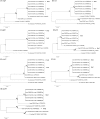Phylogenetic analysis of Mycobacterium massiliense strains having recombinant rpoB gene laterally transferred from Mycobacterium abscessus
- PMID: 28604829
- PMCID: PMC5467896
- DOI: 10.1371/journal.pone.0179237
Phylogenetic analysis of Mycobacterium massiliense strains having recombinant rpoB gene laterally transferred from Mycobacterium abscessus
Abstract
Recent multi locus sequence typing (MLST) and genome based studies indicate that lateral gene transfer (LGT) events in the rpoB gene are prevalent between Mycobacterium abscessus complex strains. To check the prevalence of the M. massiliense strains subject to rpoB LGT (Rec-mas), we applied rpoB typing (711 bp) to 106 Korean strains of M. massiliense infection that had already been identified by hsp65 sequence analysis (603 bp). The analysis indicated 6 smooth strains in M. massiliense Type I (10.0%, 6/60) genotypes but no strains in M. massiliense Type II genotypes (0%, 0/46), showing a discrepancy between the 2 typing methods. Further MLST analysis based on the partial sequencing of seven housekeeping genes, argH, cya, glpK, gnd, murC, pta and purH, as well as erm(41) PCR proved that these 6 Rec-mas strains consisted of two distinct genotypes belonging to M. massiliense and not M. abscessus. The complete rpoB sequencing analysis showed that these 6 Rec-mas strains have an identical hybrid rpoB gene, of which a 478 bp partial rpoB fragment may be laterally transferred from M. abscessus. Notably, five of the 6 Rec-mas strains showed complete identical sequences in a total of nine genes, including the seven MLST genes, hsp65, and rpoB, suggesting their clonal propagation in South Korea. In conclusion, we identified 6 M. massiliense smooth strains of 2 phylogenetically distinct genotypes with a specific hybrid rpoB gene laterally transferred from M. abscessus from Korean patients. Their clinical relevance and bacteriological traits remain to be elucidated.
Conflict of interest statement
Figures





References
-
- Hoefsloot W, van Ingen J, Andrejak C, Angeby K, Bauriaud R, Bemer P, et al. The geographic diversity of nontuberculous mycobacteria isolated from pulmonary samples: an NTM-NET collaborative study. Eur Respir J. 2013;42(6):1604–13. doi: 10.1183/09031936.00149212 - DOI - PubMed
-
- Harris KA, Kenna DT, Blauwendraat C, Hartley JC, Turton JF, Aurora P, et al. Molecular fingerprinting of Mycobacterium abscessus strains in a cohort of pediatric cystic fibrosis patients. J Clin Microbiol. 2012;50(5):1758–61. doi: 10.1128/JCM.00155-12 - DOI - PMC - PubMed
-
- Maurer FP, Ruegger V, Ritter C, Bloemberg GV, Bottger EC. Acquisition of clarithromycin resistance mutations in the 23S rRNA gene of Mycobacterium abscessus in the presence of inducible erm(41). J Antimicrob Chemother. 2012;67(11):2606–11. doi: 10.1093/jac/dks279 - DOI - PubMed
-
- Choi WS, Kim MJ, Park DW, Son SW, Yoon YK, Song T, et al. Clarithromycin and amikacin vs. clarithromycin and moxifloxacin for the treatment of post-acupuncture cutaneous infections due to Mycobacterium abscessus: a prospective observational study. Clin Microbiol Infect. 2011;17(7):1084–90. doi: 10.1111/j.1469-0691.2010.03395.x - DOI - PubMed
MeSH terms
Substances
LinkOut - more resources
Full Text Sources
Other Literature Sources
Molecular Biology Databases
Research Materials
Miscellaneous

